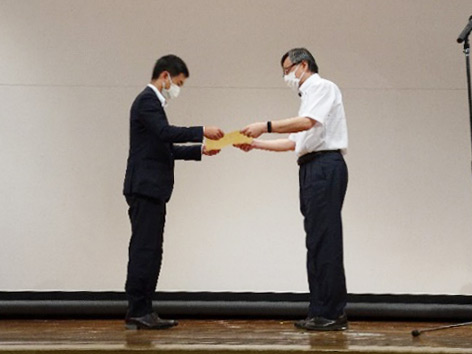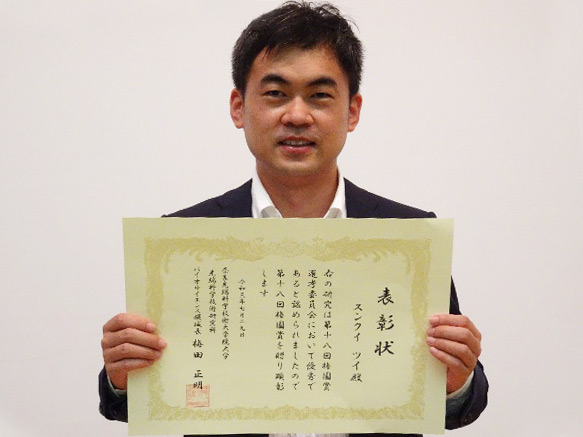第18回梅園賞授賞式が開催されました。


バイオサイエンス領域 植物共生学研究室 Songkui Cui助教が第18回梅園賞を受賞しました。
7月29日に、ミレニアムホールにて授賞式と記念講演が行われ、多くの教職員と学生が参加し、受賞者の功績を称えました。
梅園賞は、梅園基金の設立趣旨に沿って、熱気溢れる時期にバイオサイエンス研究に精進し、バイオサイエンス領域において優れた研究成果(論文発表)をあげた本学の助教あるいはポスドク研究員の原則1 名を顕彰するものです。過去において助教あるいはポスドクとして本学に在籍していた方も選考の対象としてします。対象者が研究の推進に中心的な役割を果たしたと認められる発表論文(2019年6月1日~2021年5月31日の期間に査読付き国際学術誌に発表されたもの)の学術的価値とオリジナリティの高さに審査の重点が置かれています。受賞者には表彰状と副賞が授与されました。
第18回梅園賞受賞者Songkui Cui助教のコメント

I feel really honored to receive Umesono Award from the Division of biological science since I joined NAIST for 5 years. Although there were many problems and difficulties to solve on the way of publishing this work, I had more exciting moments when new things were discovered. I think this prize is also a great recognition of our teamwork contributed by many collaborators. I am extremely grateful for Professor Satoko Yoshida who gave me lots of freedom and supports in conducting scientific research.
受賞研究の発表内容(演題と要旨)
Ethylene hormone signaling is essential for host infection by the root parasitic plant Phtheirospermum japonicum
Abstract:
Parasitic plants develop haustorium, a multicellular organ, to infect host plants and acquire water and nutrients. Such features led some parasitic plant species such as Striga hermonthica devastating agricultural pests, causing an economic loss of billions of US dollars per year. Haustorium development involves intimate interspecies signaling interaction and is strictly controlled by both intrinsic cellular programs and host-derived signals. Recent advancements in imaging and molecular studies have provided a deeper insight into cell fate changes, gene network, and molecular exchange within haustorium, yet the parasitic plant genes that mediate plant parasitism are largely unknown. To understand the genetic regulation of haustorium development, we initially conducted forward genetic screening in a model species Phtheirospermum japonicum, a close relative of Striga. Two mutants were identified showing longer haustoria compared to those of the wild type, due to extended cell division at the haustorial apex. To identify the responsible genes, we conducted whole-genome sequencing and developed an SNP detection pipeline. Mutation loci were located in an ethylene receptor ETHYLENE RESPONSE1 (ETR1) and ethylene signaling transducer ETHYLENE INSENSITIVE 2 (EIN2), respectively. Indeed, both mutants were insensitive to the ethylene hormone. Notably, these mutants showed strong defects in host invasion, leading to failure in host infection. Besides, the Arabidopsis mutant producing less ethylene was less invaded by P. japonicum, indicating that parasitic plant targets host ethylene as a signaling molecule during infection. Concomitantly, exogenous application of ethylene inhibitors successfully blocked the infection. Our study is the first report of parasitic plant genes using forward genetics and implies that parasitic plant uses core components of ethylene hormone signaling to mediate plant parasitism in response to external signals.
(2021年08月05日掲載)
 奈良先端科学技術大学院大学
奈良先端科学技術大学院大学